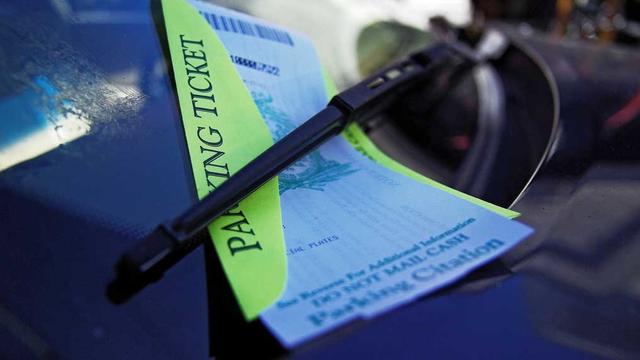It can start with a simple parking ticket. If a person doesn’t have enough money to pay the fine on time, he or she will probably be assessed an additional fee, or ordered to appear in court.
If they can’t afford the payments, they will be summoned to court repeatedly and if they miss just one appearance, may be locked up and forced to pay an additional fee for the jail stay. Pretty soon they’ve racked up hundreds of dollars in fines and fees they can’t pay off, and the cycle continues.
Criminal justice practices such as these are in wide use in cities across the country—especially those with large communities of color. Cities, counties, and townships have turned bail, civil asset forfeiture, and the like into major sources of revenue for their municipal budgets.
Such practices disproportionately affect lower-income residents and people of color, and make it more difficult for them to build assets and rise out of poverty, according to researchers at the University of Minnesota. Leading organizations including Human Rights Watch, the Office of the United Nations High Commissioner for Human Rights, and the American Civil Liberties Union are concerned about these practices and are examining them as human rights violations.
Joe Soss, Cowles Professor for the Study of Public Service at the Humphrey School of Public Affairs, has partnered with Joshua Page, associate professor of sociology, to explore what they call the “financialization” of the criminal justice system and its operations today as a “predatory” system of governance.
The project is a continuation of Soss’s work examining inequality and race in public policy, and Page’s research into inequities in the criminal justice system. Page recently got a first-hand look at these issues, having spent a year conducting ethnographic research while working as a bail bondsman.
Recent High-Profile Cases
One example of how predatory governance works can be seen in the infamous case of the city of Ferguson, Missouri, where the population of about 21,000 people is two-thirds black. The U.S. Department of Justice investigated the city’s practices following the 2014 shooting death of an unarmed black man, Michael Brown, by a Ferguson police officer.
In its final report on the investigation, the DOJ determined that the city of Ferguson had been operating a “predatory system of government.”
“Police in Ferguson were essentially directed to generate revenue for the city budget by using fines, fees, and various other tactics to target black working class and poor people, bring them into the system, and extract money from them,” said Soss.
A single missed, late, or partial payment of a fine could mean jail time. In one instance cited by the DOJ, a Ferguson resident was ticketed for parking her car illegally.That single infraction ended up costing her more than $1,000 and six days in jail.
Payments of outstanding fines and fees were pursued so aggressively that in 2013, they made up one fifth of Ferguson’s entire revenue base—an 80 percent increase over just two years prior.
Another example closer to home for Minnesotans is the case of Philando Castile, an African American man who was fatally shot by a police officer in Falcon Heights, Minnesota, during a routine traffic stop in July 2016. Castile had been cited 82 times in the previous 15 years for things like not having auto insurance and driving without a license. He owed $7,000 in overdue fines, and his license was revoked or suspended multiple times for failing to pay those fines. Soss noted that Castile was rarely cited for moving violations.
“By putting people into perpetual debt, we’ve taken away any chance they have for social mobility. It affects people’s ability to live with dignity and security,” said Soss. “And that has an impact on police-community relations and police killings. When you are constantly pulling people over for financial reasons, you’re increasing the chances that something will go bad.”
How To Respond?
These predatory tactics are not unusual, Soss said, noting that communities across the country have been practicing them for the past two decades. But their usage expanded dramatically during the Great Recession that began in 2007, when tax collections dropped due to the weak economy and municipalities needed to find more sources of revenue to pay for ongoing operations.
Soss pointed out that predatory practices aimed at the poor and people of color have existed throughout U.S. history. “Slavery, the use of prison labor and child labor, and the taking of Indian lands” are all examples, and lead all the way up to the present day.
There has been little public outcry over these practices until just recently. Soss noted that predatory governance provides a “critical backdrop” for understanding the Black Lives Matter movement, which sprung up in protest over a string of police shootings of black men.
Advocacy groups are mobilizing on this issue and filing lawsuits to challenge predatory practices. The Department of Justice under the Obama administration was vocal in calling for reform, although it’s unclear how the Trump administration might respond.
One other response to predatory governance that has been lacking is research into its causes and effects, Soss acknowledged. While many studies have looked at income inequality in the United States, most have focused on the wealthiest residents rather than the poorest.
“These predatory practices are certainly well known in the communities they target. People in our neighborhood here—the Cedar-Riverside neighborhood—know them well,” said Soss, but “they are invisible to scholars of American politics. These practices are worthy of far more critical analysis than they have received.”
The research being conducted by Soss and Page will provide some of that critical analysis. They are writing a book based on their research, which is expected to be published next year.


